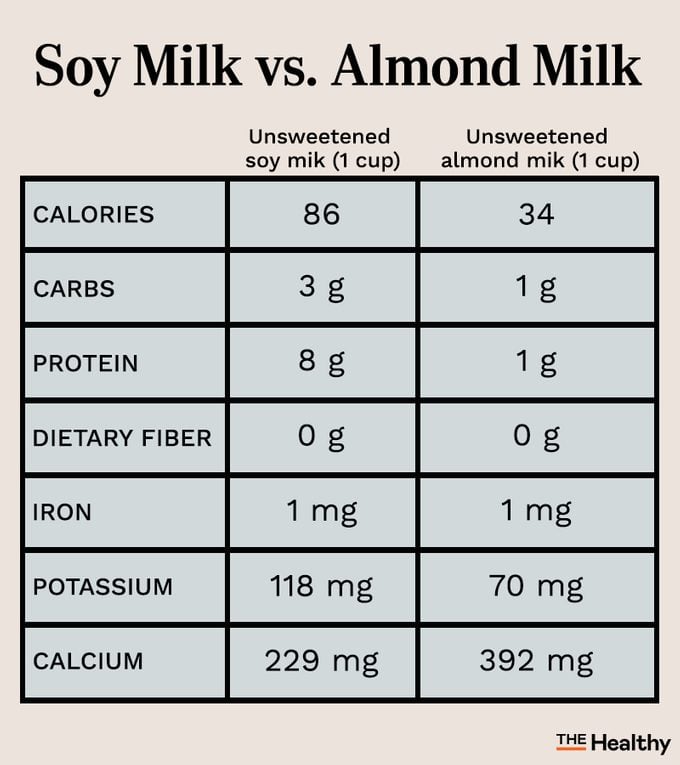Soy MiIk vs. Almond Milk: How Does Their Nutrition Compare?
Updated: Mar. 16, 2022
Following a plant-based diet and looking for a milk alternative? Here are the nutrition and benefits of soy milk and almond milk if you can't decide which one to choose.
Plant-based milks are here to stay
Nowadays, you have a veritable buffet of milk options for that morning bowl of cereal or cup of coffee. Sure, there’s cow’s milk.
But plant-based milk alternatives, like oat milk, rice milk, and even hazelnut and pistachio milks, abound. Two staples—soy milk and almond milk—are still popular.
And for good reason.
People often choose these milks when following a plant-based diet or when they have a lactose intolerance or dairy allergy. Plus, the milks tend to have a lower carbohydrate count than dairy milk, making them good options for anyone following a lower-carb diet.
Some people just prefer these milk alternatives because of their taste.
According to Research and Markets, a global marketing research firm, the plant-based milk market is expected to be a $21.5 billion industry in the United States by 2024.
So let’s take a closer look at two of the most popular plant-based milks out there: soy milk and almond milk. Here’s what you need to know about their nutrition, benefits, and which one nutrition experts prefer.
What is almond milk, and how is it made?
Nope, you can’t actually milk an almond. (Or soy beans, for that matter.) The term “almond milk” has more to do with the liquid’s consistency and appearance than how it’s made.
The drink is made from almonds and water. To make almond milk, blend the ingredients together and strain the mixture to remove the almond pieces. The milk has a nutty taste and a light, creamy texture.
“Almond milk is a great low-calorie dairy alternative that’s a great source of vitamin E,” says Kelsey Lorencz, a registered dietitian nutritionist in Saginaw, Michigan, and owner of Graciously Nourished. “You’ll find it often fortified with calcium, vitamin D, and B vitamins such as riboflavin to help improve the nutritional value.”
What is soy milk and how is it made?
“Soy milk is a fantastic alternative to dairy, especially when you’re looking for a protein equivalent,” says Lorencz. “Most soy milk is fortified with calcium, vitamin A, vitamin B12, and Vitamin D.”
Like almond milk, it takes its name from its milky consistency and appearance.
Soy milk is typically made by soaking soybeans in water overnight, then grinding the beans with water, according to the Encyclopedia of Food Sciences and Nutrition. It has a slightly sweet taste and a creamy texture.

How are almond and soy milks used?
You can do pretty much anything with almond or soy milk that you would do with cow’s milk. Add it to smoothies, use it in overnight oats, make a latte, or eat a bowl of cereal.
Soy milk nutrition
Here are the nutrition facts and percentages of daily values (DV), for for 1 cup of shelf-stable, unsweetened soy milk:
Calories: 86
Fat: 5 g (6 percent DV)
Cholesterol: 0 mg (0 percent DV)
Sodium: 76 mg (3 percent DV)
Carbohydrates: 3 g (1 percent DV)
Fiber: 0 g (0 percent DV)
Protein: 8 g (16 percent DV)
Vitamin D: 2 g (10 percent DV)
Calcium: 229 mg (18 percent DV)
Iron: 1 mg (6 percent DV)
Potassium: 358 mg (8 percent DV)
Almond milk nutrition
Here are the nutrition facts—including the percent of daily value—for 1 cup of shelf-stable, unsweetened almond milk:
Calories: 34
Fat: 3 g (3 percent DV)
Cholesterol: 0 mg (0 percent DV)
Sodium: 136 mg (6 percent DV)
Carbohydrates: 1 g (1 percent DV)
Fiber: 0 g (0 percent DV)
Protein: 1 g (2 percent DV)
Vitamin D: 2 ug (10 percent DV)
Calcium: 392 mg (30 percent DV)
Iron: 1 mg (6 percent DV)
Potassium: 70 mg (2 percent DV)

Health benefits of soy and almond milks
Soy and almond milks are healthy plant-based milks.
When unsweetened, they are low in sugar and contain fewer carbs than cow’s milk, making them good options for people with diabetes.
While they’re both solid alternatives to cow’s milk, they each offer specific health benefits.
Soy milk contains complete protein
One major perk of soy milk? Its protein content.
“Soy milk is a plant-based source of complete protein, containing all nine essential amino acids that your body can’t make,” says registered dietitian Lisa Andrews, owner of Sound Bites Nutrition in Cincinnati, Ohio.
Soy milk is good for your ticker
This plant-based milk may help your heart health.
“Soy milk contains isoflavones, which have been shown to lower [total] cholesterol and LDL ‘bad’ cholesterol levels in individuals with elevated values,” says Michelle Routhenstein, a cardiology dietitian and owner of Entirely Nourished in New York City.
She adds that soy has heart-healthy antioxidant effects and estrogen-like effects that positively impact blood vessels too.
Almond milk is low in calories
Though it contains less protein than soy milk (and isn’t a source of complete protein), this milk has fewer calories than soy milk.
“It may be better for someone who needs to watch calories closely,” Andrews says.
Almost milk is good for your bones
Parents give kids cow’s milk to keep their bones strong, a benefit that comes from the high calcium content.
“[Almond milk] is higher in calcium than regular and soy milks due to fortification,” says Andrews.
Almond milk is loaded with vitamin E
Like almonds, almond milk is rich in vitamin E. “This is a potent antioxidant that is heart healthy,” says Routhenstein.
Health drawbacks of soy and almond milks
There are a couple drawbacks of each milk product to be aware of, but first let’s clear up a common misconception about soy milk: it’s doesn’t raise cancer risk.
In the past, people were concerned about the phytoestrogens in soy milk.
“These can act as estrogen or anti-estrogen in the body,” says Lorencz. “They are known as an endocrine disruptor and can upset our natural body hormone balance. This is not a concern for most people, and the health benefits outweigh any potential negative effects.”
In fact, it may even lower the risk for breast cancer.
Soy milk’s effect on the thyroid
If you have poor thyroid function or are taking levothyroxine (Synthroid) for hypothyroidism, limit your soy milk intake, advises Routhenstein.
Soy milk is a goitrogenic food, she says, meaning it can inhibit thyroid function.
Soy allergies
Some people are allergic to soy and obviously shouldn’t drink soy milk. That said, such allergies aren’t very common.
A 2020 survey in Nutrition Today found that the prevalence of soybean allergies is lower than that of the other top allergens (those are milk, eggs, fish, crustacean shellfish, tree nuts, peanuts, and wheat.
Almond milk is low in protein
Traditional almond milk is low in protein, with just 1 gram per cup. Certain almond milks do contain more almonds—and thus more protein and other nutrients.
For instance, one unsweetened almond milk brand has 100 calories per cup and contains 4 grams of protein and 1 gram of fiber. These amounts are higher than the average cup of almond milk.
You’ll either want to look for higher-protein versions of almond milk or make sure you’re meeting your protein needs by eating other higher-protein foods.
Is one or the other better for the environment?
Many people choose to follow a plant-based diet for the environmental benefits. But choosing a more environmentally friendly product is tricky.
“Both almond milk and soy milk have a better environmental impact than cow’s milk, but both come with some drawbacks,” says Routhenstein. “For instance, almond milk uses one of the lowest gas emissions; however, it uses the most water.”
Indeed, it takes almost four times the amount of water to grow almonds versus soybeans, according to a report from the UNESCO-IHE Institute for Water Education.
“It uses roughly half of what’s needed for cow’s milk but much more than what is needed for soy milk,” Andrews says.
But that doesn’t automatically make soy milk a better bet, environmentally speaking.
“Soy milk uses less water,” says Routhenstein. “However, due to its mass production, it has destroyed many forests for land.”
Advice for any kind of plant-based milk
Whatever type of plant-based milk you’re shopping for, opt for unsweetened when possible. Sweetened milk contains added sugar.
And look for milks without certain additives when possible. This includes carrageenan, a controversial ingredient found in some almond milks that some experts say is harmful.
Routhenstein also advises avoiding milk with phosphorus additives, like disodium phosphate, which may promote inflammation.
Soy milk vs. almond milk: Which milk is better?
Either soy or almond milk can be a great choice for anyone following a plant-based diet or who is lactose intolerant.
But Andrews, Lorencz, and Routhenstein all favor soy.
“Soy milk has more protein, more potassium, more isoflavones, and more nutrients than almond milk,” says Routhenstein.
Next, here are the best plant-based protein sources.





















